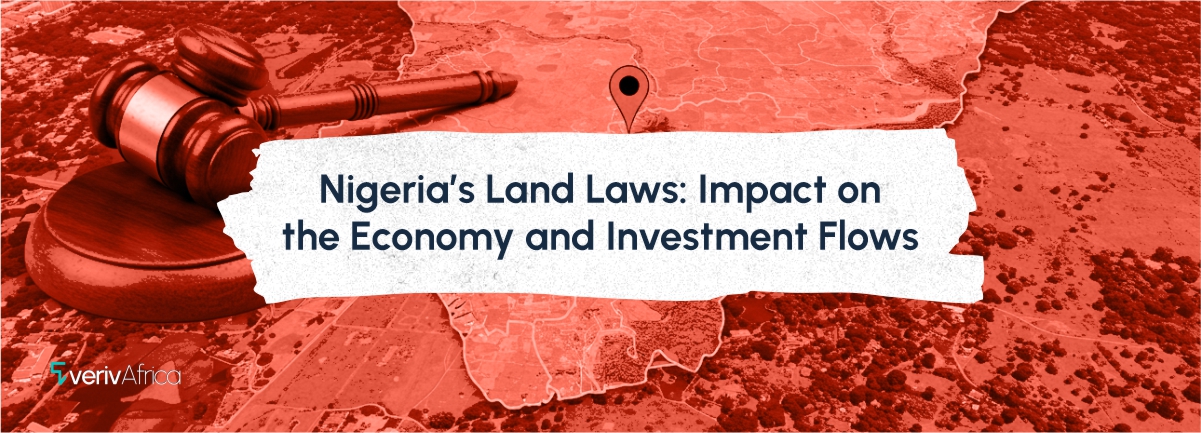Land is a key factor of production in every economy. It is even more important in a developing economy like Nigeria’s, where agriculture contributes an average of 24% to the nation’s GDP, employs at least 24 million people, and plays a major role in Nigeria’s food security. Beyond agriculture, Nigeria’s land laws play a significant role in other sectors that rely on underground resources, including the oil and gas sector, the mining sector, and, potentially, the geothermal energy sector. Ultimately, land plays a crucial role in the real estate sector, which is rapidly becoming a significant contributor to Nigeria’s GDP.
However, notwithstanding the pivotal role of land in the economy and the lives of Nigerians, the laws related to land and their application have remained below par. The most glaring statistic is the relatively low number of land titles in Nigeria. Figures by the housing and lands ministries on the percentage of untitled land in Nigeria have varied between 60% and 90% of all land. More so, land disputes reportedly account for over 30% of all cases in Nigerian courts annually and 65% of all pending civil cases. Many of these cases would be avoided or easily resolved if land laws, titling, documentation, and administration were better implemented.
The Land Laws
Following the colonisation and amalgamation of Nigeria, a series of land laws were promulgated to complement the customary land laws and tenure system in various parts of the country. Among these were the Public Lands Ordinance, later called the Public Lands Acquisition Act of 1917. This empowered the colonial government to acquire land for public works purposes. Another key decree, the Land Use Act of 1978, updated pre-existing laws and provided the template for later laws and amendments (in 2004) as Nigeria returned to democracy in 1999.
The key provisions of the current land use act are:
- All land belongs to the government. However, people and businesses can lease parcels of land for residential and other purposes with leases running between 50 and 99 years. Each leasee gets a right of occupancy for the specified lease period. There is currently no provision for permanent ownership of land.
- The land in each of Nigeria’s thirty-six states and the Federal Capital Territory is vested solely in the state governor and the FCT minister in Abuja, to be held in trust for the people of the state. This excludes land previously allocated to the Federal Government and related federal bodies, as well as land used for oil and gas and mining operations. The latter activities are solely under the control of the federal government.
- While the state governor is primarily responsible for all decisions related to land allocation and transfer, local governments can allocate non-urban land in their areas for residential and agricultural development, up to a specified maximum number of hectares.
- Transfer of land, or use of unallocated land without the governor’s consent, is punishable.
The Laws in Reality
While the laws are not perfect, they look fairly straightforward on paper. However, the reality is quite the opposite. Nigeria’s thirty-six states show significant variation in the level of sophistication in land administration, documentation, and titling. As stated in previous sections, a substantial portion of the country's land remains unregistered. Factors responsible include continued opacity in the land documentation process, corruption and extortion by land officials, the absence of clear land databases or GIS offices in many states, and abuse of power by governors through haphazard revocation.
These realities remain in the face of available land-related technologies that make it relatively cost-effective to map existing lands at scale (using drones and humans), delineate clear boundaries (using GIS), and create publicly accessible databases that show ownership and provenance (using existing cloud technologies and/or blockchain) to combat fraud and ensure seamless transfers of leases. In addition to state-based funding, state governments could secure part funding from international partners keen on improving development and reducing poverty in the sub-region, because the continued lack of clear titles and protection for existing titles is a major drag on the economy and the livelihoods of millions of low-income Nigerians.
The Impact on the Economy and Livelihoods
The absence of documentation, continued opacity, and uncertainty surrounding land tenure in Nigeria significantly impact economic growth. In agriculture, which accounts for a sizable portion of the economy and remains a key driver of employment, the absence of land titles limits access to well-priced credit. Banks and other financial institutions often require government-issued land documents as collateral for extending loans. In the absence of these documents, farmers are forced to rely on self-finance or expensive non-collateral-based loans, even though many of these farmers “own” large acreages.
Studies, including Veriv Africa’s Food Price Survey, have repeatedly shown that lack of access to finance remains the leading source of concern among farmers. Thus, the sector faces a unique situation where millions of acres of land are owned or occupied by farming families but cannot be used to secure agriculture loans or sold to raise financing for other businesses due to the absence of titles, notwithstanding the families' occupation of these lands over generations. This concept is aptly referred to as dead capital. In Nigeria, the value of dead capital tied up in untitled land is estimated at between $300 billion and $900 billion, with the higher bound of the estimate exceeding more than three times Nigeria’s entire GDP. It begs the question: why are state governments not doing more to unlock the economy by streamlining land titling and documentation within their territories, considering the potential economic benefits for their states?
Figure 1: Nigeria’s GDP in comparison to dead capital in untitled land. Source: PwC
Beyond the impact on the agriculture sector, the current state of laws and their applications continues to fuel uncertainties and raise investment risks. While the laws empower governors to make decisions on behalf of the state, the continued abuse of these powers, notably the arbitrary seizure of land and the revocation of previously granted titles without cause, remains concerning. For investors with a long-term horizon, such as those interested in perennial crop production and processing, large-scale manufacturing, and high-value hospitality projects, among others, concerns remain about what the next administration will do.
Finally, questions over jurisdiction remain. Under the law, land allocated for mining and oil and gas projects, which are exclusive to the federal government, is largely off limits to the state governor, even though the land is in the state’s territory. However, entrants into the sector cannot comfortably operate in the state and host community by relying solely on the letters of the law, as the recent incident between a state and a mining company demonstrates. Similarly, the relationship between the local government and traditional rulers vis-à-vis rural land remains unclear. Under the act, the local government has the right to allocate land in rural areas. However, each community claims certain tracts of land within its supposed boundary as ancestral land and under the jurisdiction of its traditional ruler. This has resulted in inter-community clashes, with the local government authorities remaining bystanders. In the past few years, nearly 2,000 people have died from boundary land clashes between communities. The local government area’s powers over rural land largely exist on paper in most parts of the country.
So, What Next?
Under the current land laws, state governors remain at the centre of the land administration, documentation, and management process. They must live up to the powers bestowed upon them. Technologies exist today to ensure rapid land mapping, boundary delineation, and land information database creation and maintenance. The economic benefits, including land titling charges, sales charges, multiplier effects on key sectors such as agriculture, and improved IGR and job creation, cannot be overstated. Admittedly, fully enforcing the land use act by de facto taking control of all land and retitling it among families will likely rub key stakeholders, such as traditional rulers, the wrong way. But this can be managed. What cannot be managed in the long term is the continued tying up of nearly $1 trillion in dead capital while states struggle to balance their budgets, and many sectors, especially the agriculture sector, continue to limp without adequate financing due to the absence of titled collateral.
References
Center for Public Impact. (2017). Land reform in Rwanda. https://centreforpublicimpact.org/public-impact-fundamentals/land-reform-in-rwanda/
PLAC Nigeria. (2004). The laws of Nigeria: Land Use Act. https://lawsofnigeria.placng.org/view2.php?sn=228
Punch Newspapers. (2024). Less than 10% of land titled in Nigeria. https://punchng.com/less-than-10-of-land-titled-in-nigeria-report/
Punch Newspapers. (2025). Nigeria’s real estate surges to 41.3 naira, boosts economy. https://punchng.com/real-estate-sector-surges-to-n41-3tn-boosts-economy/
Punch Newspapers. (2025). Over 1,700 killed in boundary communal clashes in seven years. https://punchng.com/over-1700-killed-in-boundary-communal-clashes-in-seven-years/#google_vignette
PwC. (2019). Bringing dead capital to life. https://www.pwc.com/ng/en/assets/pdf/bringing-dead-capital-life.pdf
The Trusted Advisors. (2024). Understanding the Land Use Act in Nigeria: A comprehensive guide. https://trustedadvisorslaw.com/understanding-the-land-use-act-in-nigeria/
Ugonabo, C. U., Ugonabo, J. C., & Emoh, F. I. (2025). A historical overview of enabling laws governing compulsory land acquisition and compensation in Nigeria. International Journal of Civil Engineering, Construction, and Estate Management. https://eajournals.org/ijcecem/wp-content/uploads/sites/45/2025/04/A-Historical-Overview.pdf
Uwadinma, A. I., & Nwakolo-Imu, K. (2023). Comparative analysis of technological advances in land registration and management across global jurisdictions. Kampala International University Law Journal. https://kiulj.kiu.ac.ug/assets/articles/1716379929_comparative-analysis-of-technological-advances-in-land-registration-and-management-across-global-jurisdictions.pdf
Veriv Africa. (2025). Nigeria food price survey 2025. https://drive.google.com/file/d/1q2RDfGDR-jt5aIRYfwcGqSBnfq4G2d-0/view










